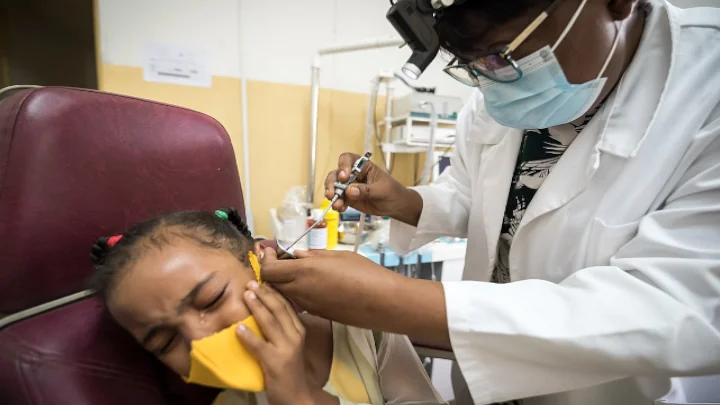What is an Otolaryngologist?

If you’ve ever thought, “What is an otolaryngologist?” you’re certainly not alone. This specialized medical field, ENT (Ear, Nose, and Throat) medicine, is pivotal in our comprehensive healthcare system. However, despite its significance, it remains relatively unfamiliar to many individuals.
This blog post will delve a little deeper and explore the world of otolaryngology to understand better its importance and the remarkable work carried out by these medical professionals. Read on to learn all the details.
Education and Training
An otolaryngologist is a medical professional who has undergone extensive education and training. Their journey begins with a four-year undergraduate degree and four years of medical school.
After this, they must complete at least five years in a residency program specializing in otolaryngology. This rigorous training equips them with the skills and knowledge necessary to diagnose and treat various conditions related to the ears, nose, throat, head, and neck.
Areas of Expertise
Otolaryngologists possess a broad range of expertise encompassing various aspects of ear, nose, throat, head, and neck health. Here are some critical areas of their specialization:
1. Ear (Otology)
Otolaryngologists are specialists who are trained to diagnose and treat a range of conditions related to the ear. This encompasses issues such as hearing loss, ear infections, balance disorders, tinnitus (ringing in the ears), and cranial nerve disorders, including facial and cranial nerve paralysis. Their expertise and knowledge enable them to provide comprehensive care for patients experiencing these conditions.
2. Nose (Rhinology)
These specialists deal with diseases of the nose and sinuses. They can diagnose and treat sinusitis, nasal obstruction, allergies, and smell disorders. They also have the skills to perform surgical procedures like functional endoscopic sinus surgery.
3. Throat (Laryngology)
Otolaryngologists also manage throat diseases, including the larynx (voice box) and esophagus. Conditions they treat include voice and swallowing disorders, gastroesophageal reflux disease (GERD), and throat cancers.
4. Head and Neck
This area of expertise covers the treatment of infectious diseases, benign and malignant tumors, facial trauma, and deformities of the face. They can perform both cosmetic and reconstructive surgery.
5. Pediatric Otolaryngology
Certain otolaryngologists specialize in the distinctive medical complexities of children. This encompasses birth defects affecting the head and neck, developmental delays, ear infections, tonsil and adenoid infections, airway complications, asthma, and allergies.
6. Allergy
Otolaryngologists can also specialize in allergy treatment, offering care to patients with a wide range of allergies. These may include seasonal and perennial rhinitis, hay fever, chronic sinusitis, sore throat, laryngitis, otitis media, dizziness, and asthma.
Each area represents a critical aspect of an otolaryngologist’s expertise, equipping them to provide comprehensive care for various conditions.
Diagnostic Procedures and Treatments
The question, “What is an otolaryngologist role in diagnosis and treatment?” is essential. Otolaryngologists utilize a variety of tests and procedures to diagnose conditions, from physical examinations to advanced imaging studies.
In terms of treatment, they may recommend anything from medication and lifestyle changes to surgical interventions, depending on the severity and nature of the condition.
If you’re wondering what an appointment is like, the visit typically begins with a detailed medical history and a comprehensive physical examination. If necessary, the otolaryngologist may order further tests to confirm a diagnosis.
When to See an Otolaryngologist
So, when should you seek professional help? A specialist is beneficial if you’re experiencing persistent or severe symptoms related to your ears, nose, or throat. This could include chronic ear infections, ongoing sinus issues, hearing loss, or unexplained neck lumps.
When choosing an otolaryngologist, consider their experience level, the types of services offered, and their reputation. Feeling comfortable with your doctor is essential, as this can significantly impact your treatment experience.
Role of Otolaryngologists in Treating Head and Neck Conditions
This brings us back to the fundamental question: “What is an otolaryngologist’s role beyond treating common ENT issues?” These highly skilled specialists excel in managing ear, nose, and throat conditions and play a vital role in the comprehensive care of more intricate and challenging cases.
With their extensive expertise, otolaryngologists can address complex larynx conditions, such as voice disorders and swallowing difficulties.
Additionally, they are well-versed in evaluating and treating head and neck tumors, which require a multidisciplinary approach for optimal patient outcomes.
Furthermore, otolaryngologists are skilled in managing facial trauma, encompassing fractures, soft tissue injuries, and reconstruction.
Their broad scope of practice extends beyond the traditional boundaries of ENT medicine, making them essential team members in providing specialized care for a wide range of conditions.
Frequently Asked Questions About Otolaryngologists
Q. What is an otolaryngologist, and what do they do?
Ans- An otolaryngologist, also known as an ENT (Ear, Nose, Throat) specialist, diagnoses and treats conditions related to the ears, nose, throat, head, and neck.
Q. When should I see an otolaryngologist?
Ans- You should consider seeing an otolaryngologist if you’re experiencing persistent or severe symptoms related to your ears, nose, or throat. This could include chronic ear infections, ongoing sinus problems, hearing loss, or unexplained lumps in the neck.
Q. How is an otolaryngologist different from a general practitioner?
Ans- While a general practitioner can diagnose and treat a wide range of illnesses, an otolaryngologist has specialized training and experience in managing diseases and disorders related to the ears, nose, throat, head, and neck.
Q. Can otolaryngologists perform surgery?
Ans- Yes, otolaryngologists can perform minor and major surgical procedures related to their expertise. This includes surgeries for chronic sinusitis, tonsillectomy, cochlear implants, and complex head and neck surgeries.
Q. What is a pediatric otolaryngologist?
Ans- A pediatric otolaryngologist is an ENT specialist who diagnoses and treats children’s ear, nose, and throat conditions. They have specific training to understand the unique medical needs of children and adolescents.
Conclusion
Understanding “what is an otolaryngologist” and the vital role these specialists play in our healthcare system is crucial. Whether you’re dealing with a minor ear infection or a severe head and neck condition, an otolaryngologist is equipped to provide practical, comprehensive care.
Remember, your health is essential, so don’t hesitate to seek an otolaryngologist if you’re experiencing ENT issues. Thanks so much for reading.
References
- Review of practical recommendations for otolaryngologists and head and neck
- What is otolaryngology–head and neck surgery?
- Otolaryngology Head and Neck Surgery





